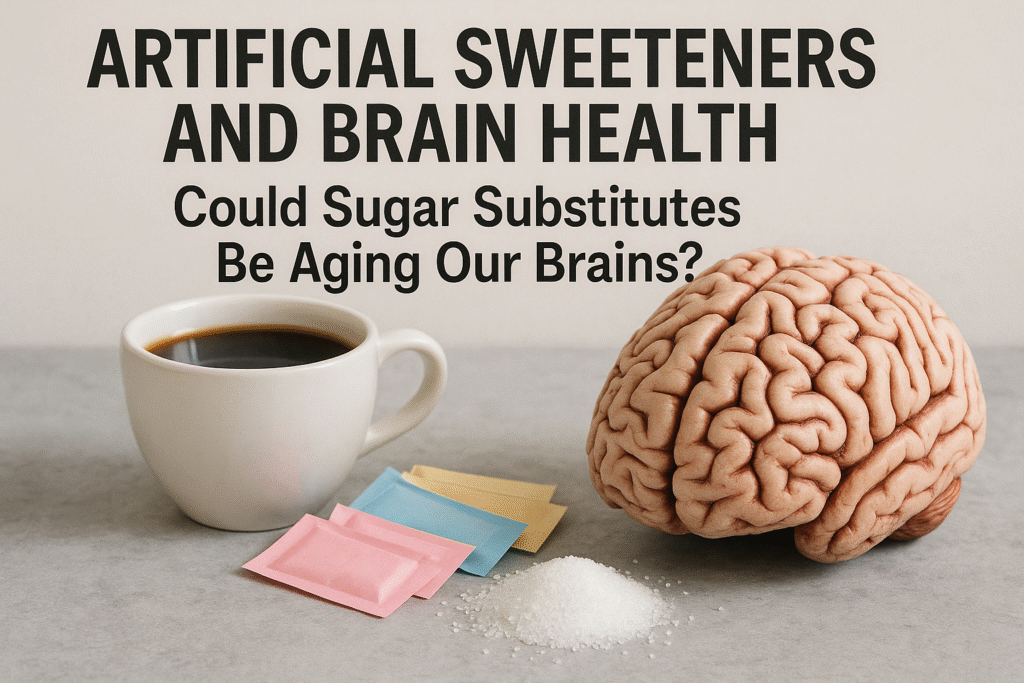By Harshit | October 19, 2025 | Washington, D.C. | 1:30 AM EDT
Growing Concerns Over Artificial Sweeteners
Artificial sweeteners — once hailed as a healthy alternative to sugar — are now under increasing scientific scrutiny. Recent research suggests that these sugar substitutes may not be as harmless as once believed, especially when it comes to brain health and cognitive function.
Millions of people around the world, including those managing diabetes, use artificial sweeteners like aspartame, sucralose, saccharin, erythritol, and xylitol to reduce calorie intake and control blood sugar levels. These substitutes are commonly found in diet sodas, protein powders, sugar-free snacks, and even toothpaste. The U.S. Food and Drug Administration (FDA) has approved several of these additives as safe for consumption, but emerging studies suggest that frequent intake could have unintended consequences on the brain.
The New Study Linking Sweeteners to Brain Aging
A groundbreaking study published in Neurology, the medical journal of the American Academy of Neurology, has raised fresh concerns. Researchers found that people who regularly consumed artificial sweeteners exhibited a decline in memory and overall thinking skills equivalent to approximately 1.6 years of brain aging.
The study examined various sugar substitutes, including aspartame, acesulfame-K, saccharin, erythritol, xylitol, sorbitol, and tagatose. These compounds, widely used in both beverages and processed foods, were associated with subtle but measurable decreases in cognitive performance over time.
Dr. Claudia Suemoto, the senior author of the study and a physician at the University of São Paulo Medical School, explained that while the findings do not conclusively prove causation, they highlight an important area for further research. “Our results suggest a potential link between artificial sweetener consumption and brain aging,” Suemoto said. “It doesn’t mean people need to eliminate them completely, but moderation is crucial until we better understand the long-term effects.”
Expert Insight: Why the Brain May Be Affected
According to Dr. Suemoto, artificial sweeteners might affect the brain through several biological mechanisms. One theory suggests that they can alter the gut microbiome, which in turn impacts neurotransmitter balance and brain function. Another possibility is that the brain’s response to sweetness becomes desensitized, leading to metabolic changes and reduced cognitive resilience.
“These compounds trick the brain into expecting sugar,” Suemoto noted. “Over time, this may disrupt the brain’s natural regulation of appetite, glucose metabolism, and even neural health.”
Researchers also pointed out that artificial sweeteners may affect blood flow to the brain and increase inflammation — both of which are linked to cognitive decline and dementia.
Balancing Benefits and Risks
Despite these concerns, artificial sweeteners do serve a purpose, particularly for people with diabetes or those aiming to reduce calorie intake. The key issue lies in overconsumption. Dr. Suemoto emphasized that occasional use is unlikely to cause harm, but daily, long-term intake could potentially contribute to cognitive issues later in life.
Health experts also caution against replacing one unhealthy habit with another. Cutting out sugary drinks only to consume excessive diet sodas may not offer the cognitive protection people expect. Instead, nutritionists recommend opting for natural alternatives like stevia or monk fruit, which are plant-based and have fewer reported side effects.
What Consumers Should Know
For now, scientists urge moderation and mindfulness. Artificial sweeteners are still considered safe within regulatory limits, but ongoing research could shift public health recommendations in the future. Consumers should focus on balanced diets rich in whole foods, fruits, and vegetables to support both metabolic and brain health.
Dr. Suemoto concluded with a measured perspective: “We need more long-term studies to understand how these sugar substitutes influence our brains. But this research reminds us that not all ‘sugar-free’ options are automatically risk-free.”

